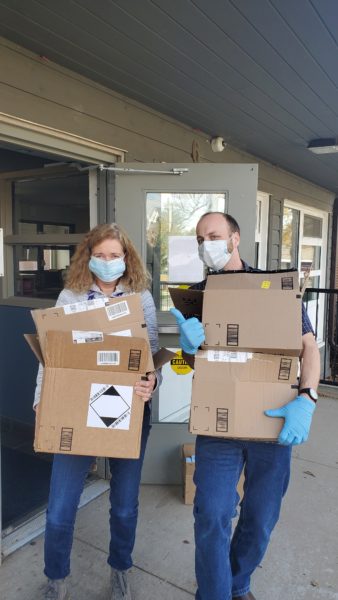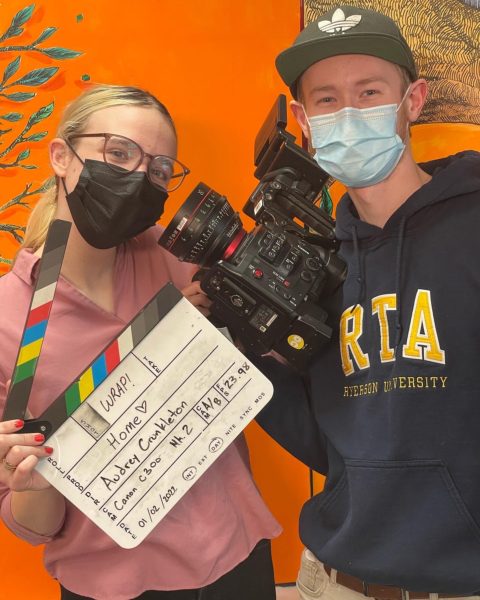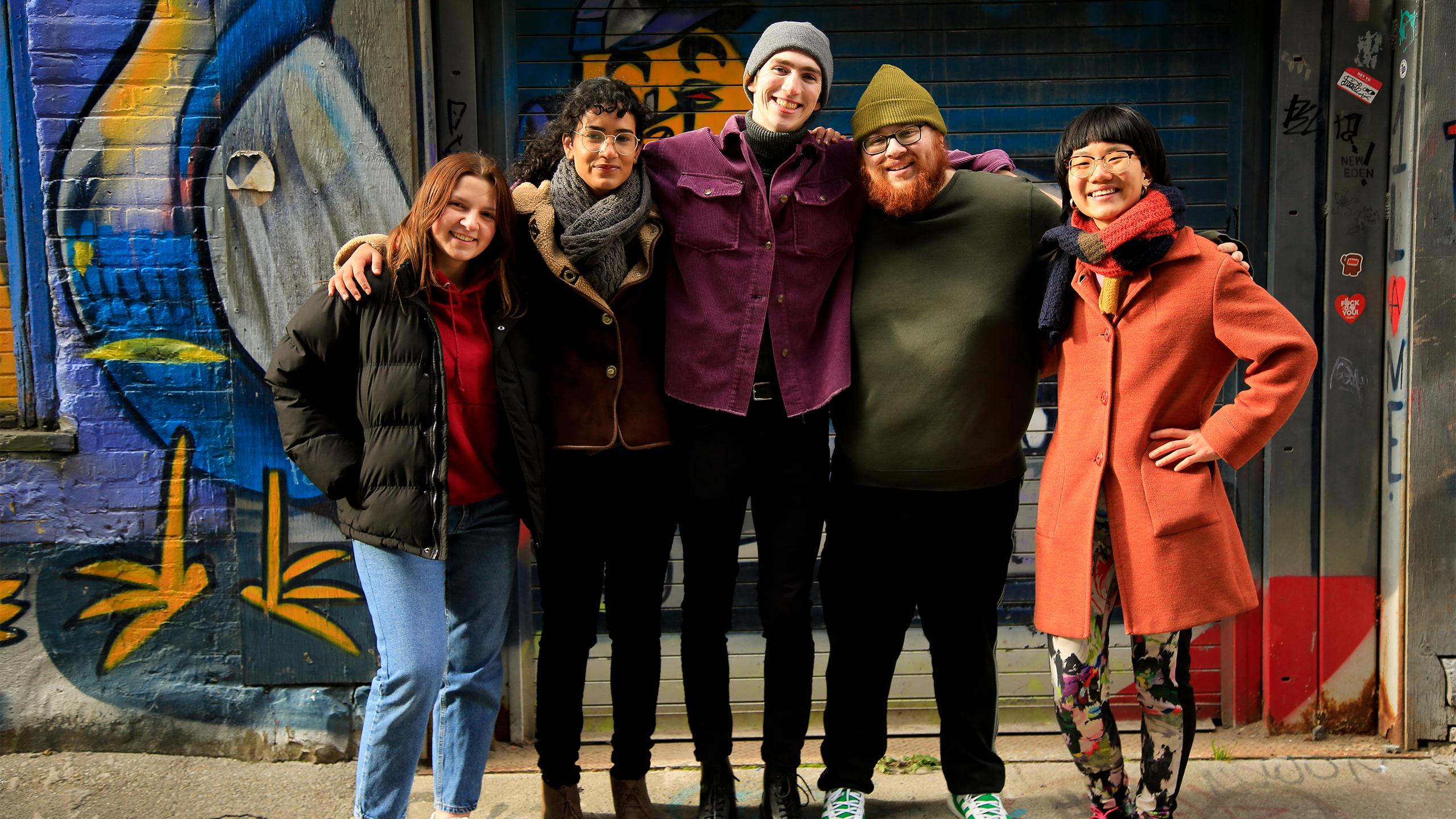By Serena Lopez
Whether you’re experiencing it or know someone who is, putting a face to the youth homeless crisis in Toronto can often be difficult. For that reason, fourth-year media production student Audrey Crunkleton is directing and producing a documentary to highlight those who are making a difference in their community.
The documentary, titled Home, is made in partnership with Youth With Shelter (YWS), a charity in Etobicoke that provides mental health, career and educational services for youth between the ages of 16 to 24. Home follows the staff and volunteers of YWS working together with local artists to raise money for their annual fundraiser Time4Change.
The fundraiser runs the entire month of February and focuses on educating the public about youth experiencing homelessness through virtual art performances and a gallery made by independent artists and school groups in Etobicoke.
Before discovering the initiative, Crunkleton said she interviewed several charities out of interest in using her media skills to get involved with the nonprofit sector. It was as part of her research for organizations that she landed on YWS and was inspired to cover the group for her documentary.

She decided on YWS after connecting with their coordinator, advocacy and public relations Anastasia Kemp, becoming enthralled by the multiple services outside of housing that were offered by the organization.
After waiting about a year for funding to complete the documentary, Crunkleton and her small production team spent two weeks in January talking to the volunteers and community members that interact with youth who experience homelessness on a daily basis.
The film also explores the reaction from staff and volunteers after they successfully reached this year’s goal of raising $110,000 in donations, bringing them to a cumulative total of over $1 million dollars in 12 years.
“I hope that people leave feeling inspired to be a part of the solution instead of dwelling on the problem.”
In her experience watching several documentaries that covered topics related to youth experiencing homelessness, it was hard for Crunkleton to ignore how many of the films were so heavy, hard to watch, and exploitative of those experiencing homelessness.
“The thing about homelessness is that it’s often temporary…I wanted to make sure that I didn’t focus on anybody experiencing homelessness in my documentary, because I didn’t want that to be followed around with them,” said Crunkleton.
Though youth homelessness is a huge problem in Toronto, instead of reiterating stories of suffering, she says her film focuses on the positives by showing the faces of those who dedicate their time to running programs and contribute to building a strong community for youth experiencing homelessness.
“I hope that people leave feeling inspired to be a part of the solution instead of dwelling on the problem.”
A 2016 report by the Canadian Observatory on Homelessness Press found that youth aged 13 to 24 make up 20 per cent of the homeless population in Canada. Furthermore, 40 per cent of youth experiencing homelessness became homeless before the age of 16, according to a 2017 report.
Crunkleton said the youth homelessness crisis is especially personal to her because she is also within the age group of young people who are experiencing homelessness. She aims to break the cycle of talking about the issue as if it couldn’t someday happen to anyone.

“When you walk down the streets of Toronto, it’s easy to stereotype what homelessness is because you see certain demographics of people that are usually older, and they’re usually dealing with drug problems, but there’s so many different other areas [of homelessness],” said Crunkleton.
She explained that many times youth experiencing homelessness are not visible on the streets; they are often couchsurfing or get caught in dangerous situations, which can be overlooked or discussed in ways that exploit the problem rather than making people feel a part of the solution.
A study by Loloya University in New Orleans that looked at Covenant Houses—shelters that provide housing and services to youth experiencing homelessness—in the U.S and Canada found that 19 per cent of youth studied were victims of human trafficking.
But Crunkleton said she wasn’t always fully aware of the causes and effects of youth homelessness prior to filming.
Through the process of filming the documentary, Crunkleton learned more from staff and volunteers about the underlying issues that contribute to the stigma surrounding youth homelessness and ways that she could change the way she looks at homelessness in her personal life.
“Even little things like changing your language can make a huge difference in somebody’s life with their self esteem,” she said. “If you say ‘a person experiencing homelessness’ [instead of saying ‘a homeless person’] it shows in your language that it’s something that’s temporary and it’s not a defining characteristic of them.”
“A lot of people—in Toronto especially—will look at people on the street and call them ‘crackheads.’ Saying stuff like that really dehumanizes the person and it makes it easy to forget about their problems or ignore it.”
“Even little things like changing your language can make a huge difference in somebody’s life with their self esteem”
Steve Doherty, executive director at YWS, said he was excited to invite Crunkleton and her production team, made up of several other Ryerson media production students, into their space after a year of both triumphs and pandemic-related trauma that affected those living in the shelter and their staff.
“The fact that young people want to highlight what is going on and want to look at the alternatives with some of our solutions and our efforts…that was even more important,” he said. ”They just weren’t there to sort of document it; in my discussions with them, they actually started to feel it.”
Now in post-production, Crunkleton is once again switching hats and is currently in the process of editing the film for release in mid-May.
She plans on submitting the film to North American movie festivals and theatres in Toronto as part of a future fundraising campaign for youth homelessness.
“I definitely want to keep making topics about underrepresented communities,” said Crunkleton.
“I want to use my privilege and the fact that I have an education from Ryerson with access to equipment to help tell these stories and help elevate people.”
If you or someone you know is experiencing homelessness in Toronto or the GTA, you can visit the Ryerson Centre for Student Development & Counselling, or visit the YWS website for more information on ways to get help.
CORRECTION: A previous version of this story incorrectly listed Anastasia Kemp as YWS’ youth and engagement specialist. In fact, she is the coordinator, advocacy and public relations at YWS. The Eyeopener regrets this error.










Leave a Reply